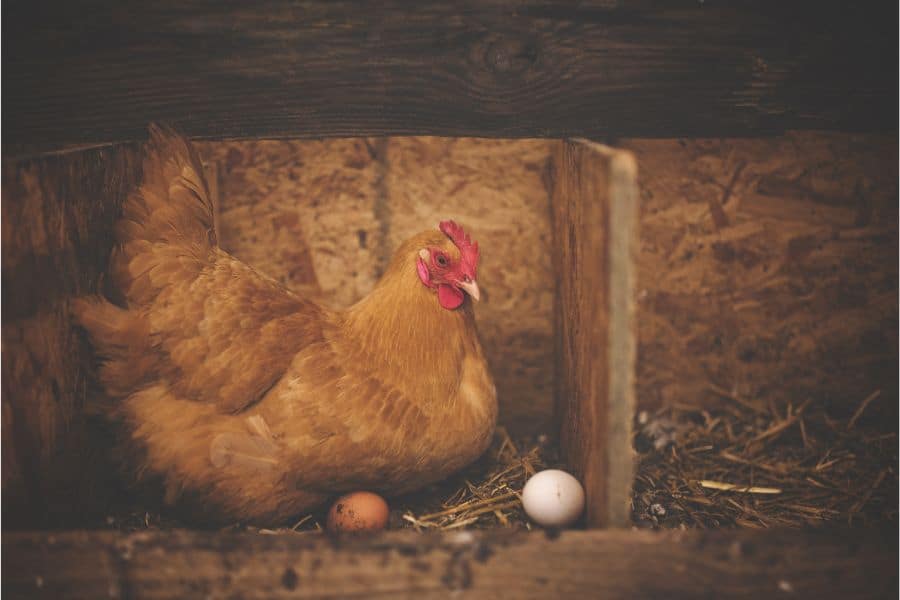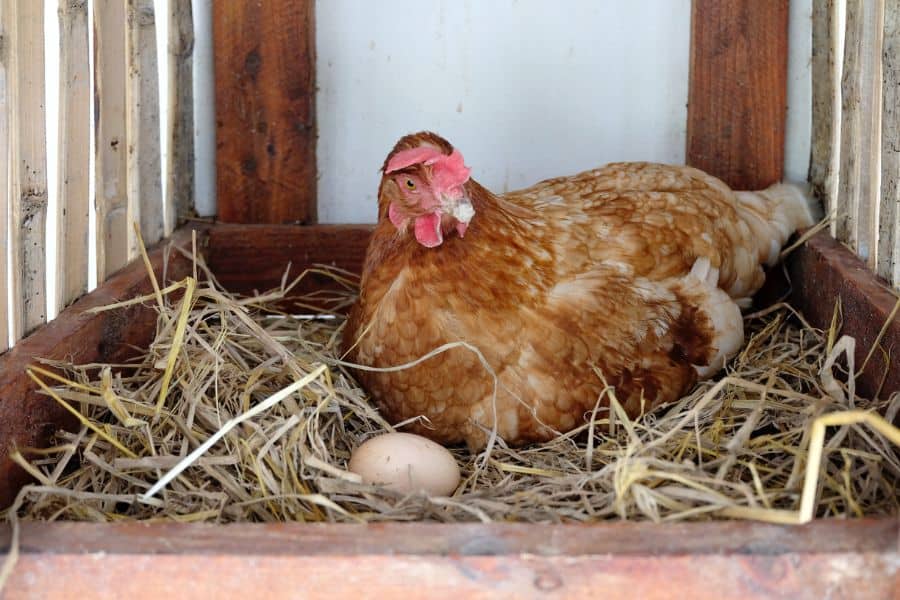If you’ve ever looked at a large egg and imagined it must have hurt the chicken to lay it, you’re not the only one. As far back as Roman times, humans wondered just how much pain chickens experience when laying eggs.
This is a sensible concern because egg-laying is a chicken’s equivalent of giving birth and we know how that goes.
Many mammals, including humans, experience some pain during childbirth. Thus, many people have questioned if chickens go through a similar experience when laying eggs.
Many new small-holder farmers start their journey hoping to raise their chickens under less stressful conditions. We explore the issue of egg-laying and whether you should be concerned that it’s putting too much stress on your hens.
Is Egg-Laying Painful?
This is not a question that can be definitively answered today, but there are indications that under normal conditions, egg-laying isn’t painful to your hens.
Some experts say that even if a little uncomfortable, it is not close to the kind of discomfort humans and other animals experience when giving birth.
This is good news to many of us who prefer the pleasure of eating eggs without subjecting our hens to unnecessary discomfort, but there is still some cause for concern.
Why is Normal Egg-Laying Unlikely to be Painful?
There are several things that experts have pointed out as indicators that egg-laying doesn’t cause significant pain to hens. These include:
- Unhappy or stressed chickens would lay fewer eggs.
- The reproductive system of chickens is not like that of humans and other mammals.
- Chickens typically seem calm about the process of laying eggs.
- The shape of the egg makes it easy for it to pass through the chicken’s cloaca.
There are some who also believe that the sounds made by chickens after laying an egg, also called the ‘egg song’, is an indication of contentment. However, this is an unproven theory.
What May Cause Egg Laying to Be Painful?
As great as it would be if we had chickens laying all the eggs we needed without being in any sort of pain, the reality is that nothing is ever ideal. When it comes to laying eggs, this is a process that also doesn’t always go as planned.
Egg laying can be a painful process or a process with painful results for the hen in any of the following situations:
- When the hen is young and is only starting to lay her first eggs.
- If the egg being laid is uniquely large i.e., double yolk egg.
- If the egg breaks inside the hen.
- If the egg gets stuck inside the chicken i.e., egg binding.
- If the hen suffers a keel bone fracture when laying an egg.
Apart from the first situation which is normal to a degree, the other situations are not as common and may be caused by avoidable issues.
Signs Egg Laying is Causing Your Hen Distress
Regardless of the cause, you want to know quickly if any of your hens is experiencing some distress because of laying eggs. Some of the issues causing the pain will require your quick intervention without which you may lose your feathered friend.
If egg-laying is causing your hen pain, some of the signs they may display are:
- Not drinking water or eating their food.
- Avoiding other chickens
- Making wheezing sounds or squawks that indicate distress.
- Limited movement
- Awkward and slow movements
- Drooping or hunching over
- Blood on the egg, cloaca, or where the hen was sitting.
Why do Chickens Squawk After Laying an Egg?
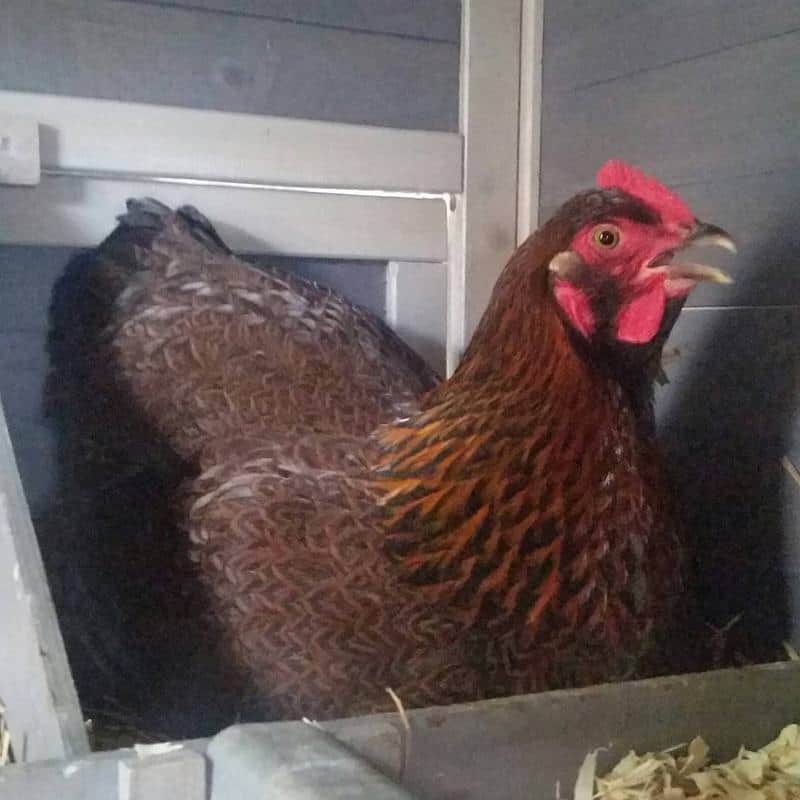
According to an old report, the noise hens make after laying eggs is because the presence of the egg inside the hen’s body causes her some discomfort. The sound she makes after laying or the ‘egg song’ is just how she expresses relief that the discomfort has passed.
To this day, nobody knows whether this theory is accurate. However, there have been alternative theories regarding the cause of the egg song including:
- The hens make the sounds to locate the rest of the flock. Hens will usually seek some privacy when they want to lay eggs and this can cause them to become separated from the rest of the flock for a while.
- Hens make the noise in an attempt to lure potential predators away from the freshly laid egg. Such attempts at distracting predators are not uncommon in other birds, some of which go as far as feigning injury or sitting on a fake nest.
All three explanations seem plausible but there is no definitive proof that one has more merit. This means that the mystery of the egg song will persist a little longer.
How Long Does It Take for a Hen to Lay an Egg?
Chickens that are considered good layers can produce 5 to 7 eggs every week during their laying season.
This means that at their peak, your chickens may be laying one egg every single day. The entire process of egg formation to laying takes between 24 and 26 hours so it makes sense how a chicken can lay one egg every day.
This does not mean that the chicken will have a fully formed egg inside her for 24+ hours. The process starts with the yolk moving from the ovary to the reproductive tract and at that stage, the egg has neither the size nor the shape of the final egg.
Formation of the shell takes up much of this 24 to 26-hour period.
Passing of the actual egg from the chicken into the world is a relatively quick process with the longest estimates putting the time limit at 30 minutes. Other sources state the passage of the egg into the cloaca and out takes less than a minute.
This means that even if there is some discomfort associated with laying eggs, it likely lasts a very short period. This also shows why egg binding is a serious problem for chickens in the rare instances when it occurs.
What is Egg Binding and How to Address It?
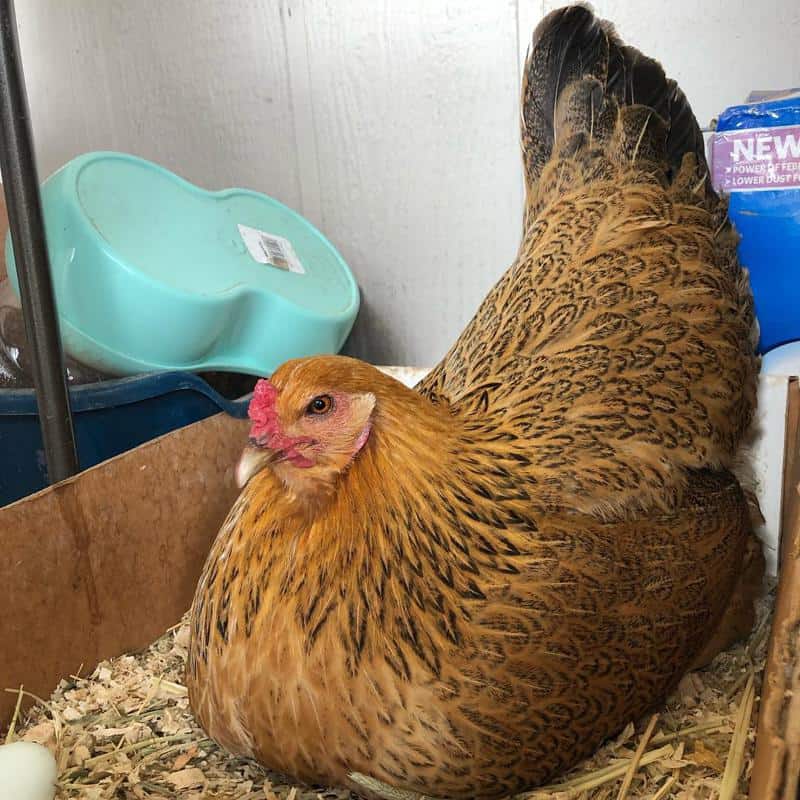
Egg Binding
Egg binding is a situation that occurs in some egg-laying animals where the female is not able to expel the egg through the cloaca.
Egg binding can be brought on by a wide range of factors including:
- Obesity
- Poor diet
- Very large eggs
- Trauma
- Premature egg production
Although any chicken today can be affected by this condition, breeds and hybrids that are known as high-yield layers are more likely to experience this problem. One reason is that laying an egg every day can negatively affect the reproductive tract of the hen.
Signs a Hen is Egg Bound
Some of the signs that your hen is egg bound are:
- Straining i.e., the hen will look like they are trying to lay an egg, but the egg does not appear.
- The hen will become isolated, eat less if at all, and frequently close their eyes.
- Regular wagging of the tail
- Their abdomen may become distended.
- The hen will sleep on the ground instead of perching.
- Sudden lameness on one leg.
How to Help an Egg-Bound Hen
Being egg-bound isn’t just uncomfortable for the hen, it can be life-threatening. The best course of action is to intervene and assist the hen to pass the egg as quickly as possible.
Intervention, in this case, involves isolating the hen to a more comfortable environment, giving her a warm bath, and applying some lubricant in the vent area of the hen. Veterinary intervention may be necessary if all else fails.
Making Egg-Laying Less Uncomfortable
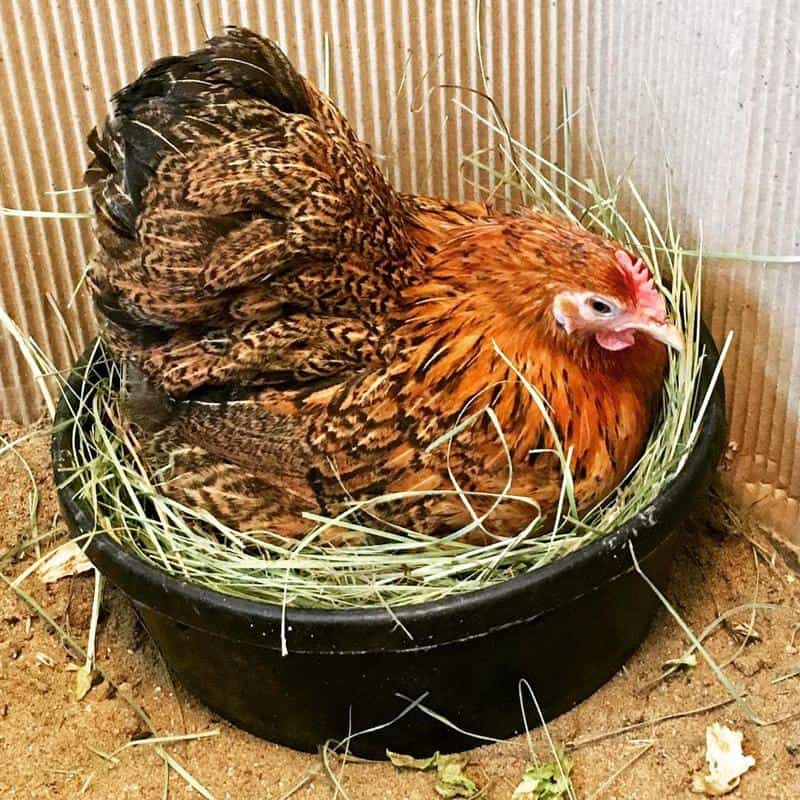
Although there are certain factors you can’t control, there are still a few things you can do to make egg-laying less likely to be uncomfortable for your hens.
One factor that can be controlled to some degree is the laying of large and extra-large eggs. Diet is a key factor in this with high protein diets said to lead to larger egg sizes at some point.
Another issue is the fact that many laying hens are bred to be small. This smaller body size is unable to cope with the larger size of the eggs.
Although some of these problems will require generations of breeding to correct, farmers today can also take measures like delaying when their hens start laying eggs. This will give the chickens’ bodies time to become stronger.
Also Read:
Laying Eggs Should Be Painless but Sometimes Isn’t
According to current research, hens should be experiencing limited discomfort when laying eggs. This is especially because the actual process of passing the egg out of the chicken’s body is a relatively quick one.
However, factors such as the size of the egg, the age of the chicken, and reproductive complications can make the egg-laying process painful. In some cases, these complications can be fatal to your chicken.
There are several things that you as a farmer can do to reduce the possibility of these issues. These include not feeding your chickens with the aim of getting very large eggs, feeding your chickens a balanced diet, and avoiding layers with small bodies relative to the size of their eggs.
